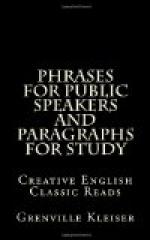From Sermon, “The Adequacy of Present Opportunities.”
* * * * *
Instantly under such an influence you ascend above the smoke and stir of this small local strife; you tread upon the high places of the earth and of history; you think and feel as an American for America; her power, her eminence, her consideration, her honor, are yours; your competitors, like hers, are kings; your home, like hers, is the world; your path, like hers, is on the highway of empires; our charge, her charge, is of generations and ages; your record, her record, is of treaties, battles, voyages, beneath all the constellations; her image, one, immortal, golden, rises on your eye as our western star at evening rises on the traveler from his home; no lowering cloud, no angry river, no lingering spring, no broken crevasse, no inundated city or plantation, no tracts of sand, arid and burning, on that surface, but all blended and softened into one beam of kindred rays, the image, harbinger, and promise of love, hope, and a brighter day! Rufus Choate.
From “Oration on American Nationality.”
* * * * *
I believe in woman-suffrage for the sake of woman herself. I believe in it because I am the son of a woman and the husband of a woman and the father of a prospective woman. I remember that at one of the first woman-suffrage meetings I ever attended one of the first speakers was an odd fellow from the neighboring town, considered half a lunatic. That didn’t make much impression in those days when we were all considered a little crazy, but he was a little crazier than the rest of us. He pushed forward on the platform, seeming impatient to speak, and throwing his old hat down by his side, he said, “I don’t know much about this subject nor any other; but I know this, my mother was a woman.” I thought it was the best condensed woman-suffrage argument I ever heard in my life. Thomas Wentworth Higginson.
From “For Self-respect and Self-protection.” When the people complain they must either be right or in error. If they be right, we are in duty bound to inquire into the conduct of the ministers and to punish those who appear to have been most guilty. If they be in error, we ought still to inquire into the conduct of our ministers in order to convince the people that they have been misled. We ought not, therefore, in any question relating to inquiry, to be governed by our own sentiments. We must be governed by the sentiments of our constituents if we are resolved to perform our duty both as true representatives of the people and as faithful subjects of our king. Lord Chatham.




